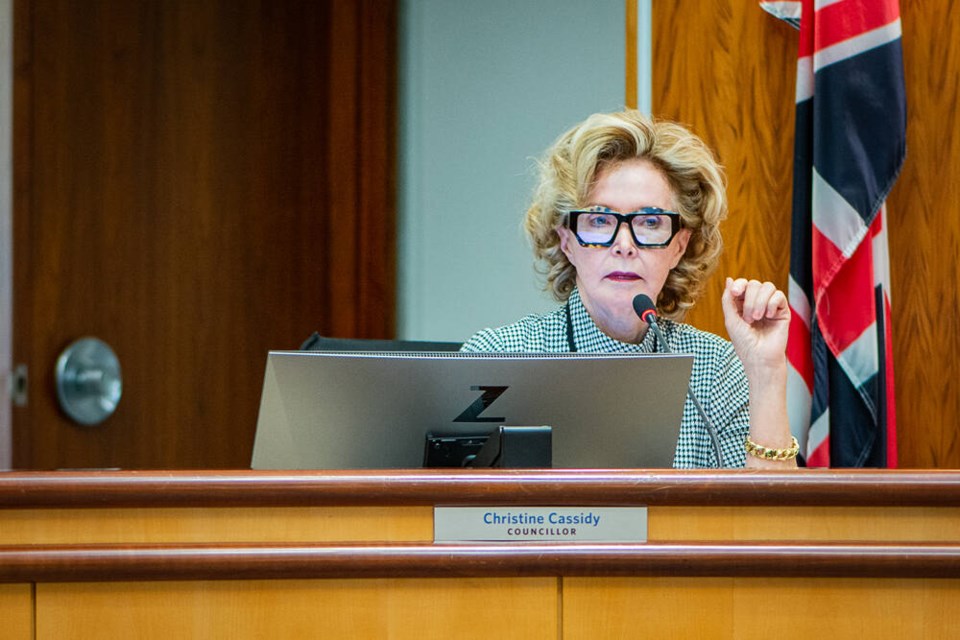Taxpayers in West Vancouver are facing rate increases similar to or slightly above other municipalities on the North Shore this year.
On Monday, a majority of council approved a proposed 7.54-per-cent increase to the district’s tax rate. Only Coun. Nora Gambioli dissented, who advocated for a portion of the increase to go to environmental initiatives.
Additional budget items were not adopted, including drought relief for trees on public boulevards, a request to fund a translation program to provide safety messages in other commonly spoken languages, as well as support for arts groups. But money to pay for “clean up of homeless encampments” was approved.
The proposed budget includes a $3.1-million hike of the operating levy. That 3.54-per-cent increase is lower than the “keeping the lights on” amount originally proposed by staff at 3.65 per cent. The budget proposal also involves upping the asset levy by $3.5 million, a four per cent increase, compared to two per cent last year.
Combined, the increases represent an impact of $440 on the average single family detached home assessed at $3.7 million, or $194 on the average strata property at $1.7 million.
Much of the district’s focus during budget discussions has been on the prevalence of ailing assets, and if staff are able to shift money from other funds to pay for items outside of the usual scope.
At a budget committee meeting Monday afternoon, preceding the evening council session, Coun. Linda Watt asked staff why cost charges to developers can’t be used to fund bridge maintenance, for instance. But director of financial services Isabel Gordon advised great caution before the district considers transferring money between reserves.
When development cost funds are on hand, bridge repair seems like a reasonable use for that money, said Gordon, but “unfortunately, the answer to that is: not quite. [Development cost charges] can only be used for the particular project they were collected for."
“So if we collected money for the McDonald Creek bridge, which we did, then we can use the money to fix the McDonald Creek bridge. We can’t use it for another bridge unless we get permission from the minister [of finance] to do that,” she said.
Gordon later clarified that if funds were used from a reserve in an unintended way, a member of council who voted for that could be personally liable to return those funds, under the Community Charter.
Also at the budget meeting, several of the asset projects being proposed were put under the microscope, particularly by Coun. Christine Cassidy.
Among other items, she questioned the need for a multi-year capital renewal plan at the district’s firehall in the Caulfeild area.
“Firehall 3 really is a very passive, shall we say, firehall. So why are we needing to be spending $525,000?” she asked. “I mean, these various asks, we’ve never questioned that.”
Going through a list of work that includes roofing and electrical upgrades, much of the infrastructure is close to the end of its useful life, said John Wong, senior facilities and asset manager.
“There is the risk of failure,” he said. “And you don’t want emergency failure, especially at the firehall.”
This is the year to go lean on operating expenses, councillor says
Working with smaller asset levies in recent years has been very challenging, said Coun. Scott Snider.
“We’ve seen it already in our assets and how they’re failing,” he said. “And when they fail without being properly maintained, it just costs a lot more money in the long run.”
Coun. Sharon Thompson said this is the year to go lean on operating expenses, with funding requests denied from organizations like West Vancouver Community Arts Council, which has expressed financial challenges in recent years.
“At the same time, we’re putting this incredible amount towards our asset levy,” she said. “That comes from the need and the ongoing demand to deal with our assets that have been in compromised.”
One arts organization that might get a financial boost this year is Kay Meek Arts Centre. Mayor Mark Sager suggested that some money could be taken from contingency for the adjacent Place for Sport project.
“It just seems fair and right that we would find out of that budget some consideration for the facility that is suffering during construction,” he said.
Gordon replied that staff would look into the ability to make a one-time contribution this year.
Stressing the need to have a sufficient capital buffer to address climate emergencies, Coun. Nora Gambioli was the lone voice on council advocating for an increase to the environmental levy. She suggested an amendment to the motion that a 0.5-per-cent hike go to the environmental fund, lowering the asset levy to 3.5 per cent.
“I think that a 0.5-per-cent increase in the environmental levy is really a must,” she said.
Asked to second her motion, no other councillors raised a hand.
“I would have seconded it, but it doesn’t look like it’s going to go,” Sager said.
The proposed 2024-'28 financial plan will be brought to council for consideration on March 11.




